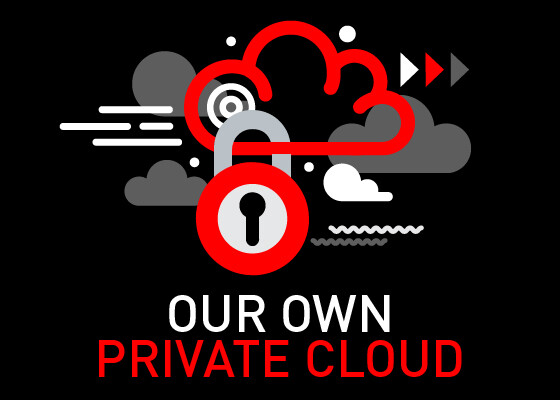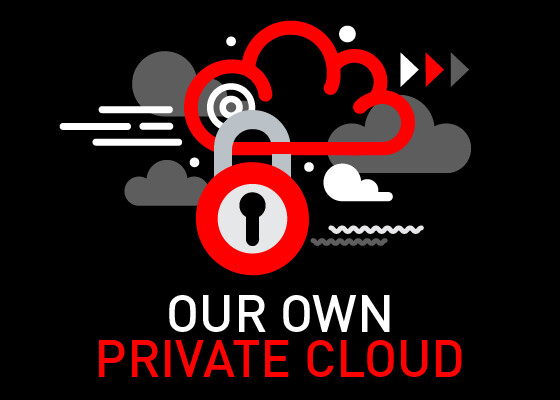Your business has decided to move into the cloud, but which system should you choose? In the first of a three-part series we look at the benefits of building your own private system.
Your business has decided to move into the cloud, but which system should you choose? In the first of a three-part series we look at the benefits of building your own private system.
Cloud computing is a handy little phrase that encompasses many different infrastructure models, services and software, but with some common attributes. Cloud provides an elastic infrastructure that is centrally managed but available to consumers on a self-service basis.
Broadly speaking, there are three kinds: public, hybrid, and private.
Public cloud systems run on shared services rented from providers. They are flexible and ideal for dealing with highly variable loads, because services can be scaled up rapidly to deal with demand and scaled back when no longer needed.
Hybrid clouds often use the organisation’s own hardware to deal with some workloads and make use of public space for other work. Again flexibility is the key, but keeping some work in-house can reduce costs, maximise ROI on existing hardware and in some cases make security and compliance easier.
Why would you choose private clouds?
By contrast, a private cloud can run entirely in-house in the organisation’s own datacentre, or on dedicated hardware in a shared datacentre. Either way the key benefits are:
Security
The organisation knows exactly where all its data is and who has access.
Reliability
Whereas the performance of public clouds can be affected by capacity demands of other customers’ workloads, private clouds are not subject to external activity.
Finance
On the one hand, using public cloud facilities is an ongoing expense and facilitates an OPEX model. On the other, an in-house private cloud is a substantial CAPEX investment but in some circumstances this approach can work out to be more cost effective in the long term.
Security
Security and compliance are big issues, especially for e-Commerce organisations that hold millions of customer records. In addition, some countries and blocs such as the EU insist that certain types of data reside within their borders. Government contractors are often required to keep their data in the country concerned as well.
Although public cloud providers have improved their services and can offer localised clouds and compliance with security protocols, errors still occur and vulnerabilities are exploited. As a result, many organisations are still nervous about having their data on a virtual server sharing infrastructure with another organisation whose security may not be so robust.
Reliability
Service level agreements and ‘uptime’ promises are all very well, but for total reliability some organisations prefer to design and manage their own infrastructure. It can be expensive maintaining surplus capacity to deal with outages and performance demands – and skilled staff are needed – but organisations as diverse as the European Space Agency andDreamworks believe this investment to be worthwhile.
Finance
Creating a private cloud, installing servers and storage hardware can involve significant investment, but this has to be balanced against the benefits. A well designed and properly managed private cloud offers unparalleled data security and service assurance, where data loss is rendered less likely and the brand reputation is enhanced.
Managing a private cloud
It is often assumed that having a private cloud infrastructure means that the organisation must have a team of system administrators working shifts to manage it. If it were true it would involve significant costs and be a major reason not to have a private cloud.
Fortunately, LinuxIT offer a managed service which is perfectly capable of managing your private cloud whether it is on-premise or hosted in a virtual datacentre, or a combination of the two. Remote management doesn’t compromise your security, the data stays where you want it, and it facilitates changing your PaaS provider. In other words, you can move your platform and the management remains the same.
LinuxIT’s PaaS management is provider agnostic, they are happy to work with any of the usual providers, and since becoming part of the Claranet group are in a position to offer a complete fully-managed PaaS.
You decide
Every organisation is different and there’s no one-size-fits-all Cloud solution. Talking it over with a consultant can be a great help in understanding all the pros and cons of different cloud infrastructures and services.
For more information on when to use on-premise, cloud and hybrid computing, take a look at our latest eGuide below. Then contact us to discuss your organisation’s cloud IT with one of our consultants.
Find out which Linux environment is right for your business – Download this guide: In the Cloud or on the ground? Your guide to the right Linux environment for your business.
This post first appeared on the LinuxIT blog










